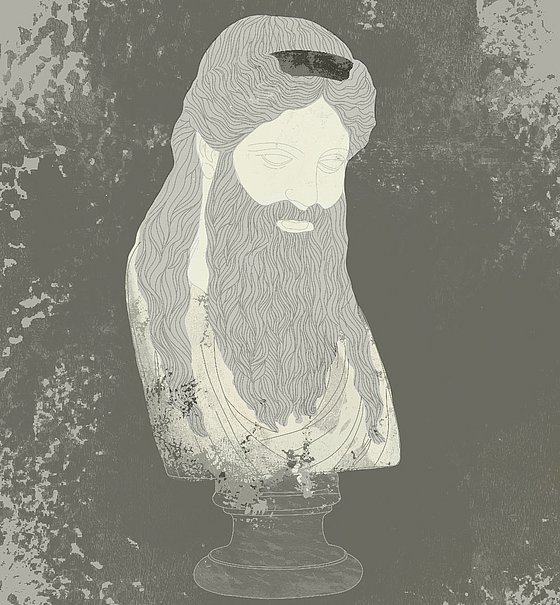
The importance of the body in society
Dr. Steffi Grundmann researches ancient physical culture
Celebrities have been demonstrating it to us for years now: Whether Kim Kardashian's flawless back view, David Beckham's best piece in the brand-name underwear, Madonna's fully retouched, naked full-body view or Burt Reynolds, as God created him, on a bearskin. They all have graced the covers of the tabloids. Sex sells, the makers say and have put the bodies of the rich and beautiful in the right light again and again. But why does this excite us so much, since we already know in advance what to expect when we look at breasts, bottoms and the like? What is it that fascinates us so much about these ever-young bodies?
Old sources, new questions
People's appearance has always played an important role in society. These days, the run on hairdressing salons and barbershops made us understand this once again. Historian Steffi Grundmann, who studies ancient physical culture at the University of Wuppertal, knows only too well that the subject is as old as the world.
'The history of sexuality' by the Frenchman Michel Foucault is central to this, Grundmann explains. Many scholars, who deal with the history of the body, use his books as a guide. For the historian, there are also women's and gender studies as well as the history of medicine. These studies each look at the body in their own way. In the 1990s, this research experienced a strong turnout, Grundmann knows, but that was now 30 years ago. Today, one has to think differently about ancient bodies and sexualities. "Since the 2010s, there have been new impulses. That is also exactly the area to which I would assign myself, namely to not only look at the body medically, but to ask about the relationship between the body and politics. That is a big field, but one that has not been dealt with very much in German classical studies." The view of the same sources, which have been known for more than 2,000 years, is changing due to the internationally different language and research traditions. This leads to the fact that, today, science can address new questions to the sources.
Body and soul
"A very important, central idea that comes from Greek philosophy is the separation of body and soul. This is very familiar to us in modern, Western contemporary societies," Grundmann says. "The idea that the body is something other than the soul and the spirit is something that we owe to Socrates in a very big way." "Plato adopts it, Aristotle as well, and in modern philosophy it is still a central approach today." In medicine as a science, too. The 5th century BC brings a marked change. In addition to the more manual healing and compilation of medicines, the body as such now moves more and more into the centre of attention. This can be seen in the Corpus Hippocraticum (A collection of more than 60 medical texts written from the 6th century BC to the 2nd century AD, editor's note) very nicely. "Extremely different ideas are represented, but a clear thrust is now to look at the body and to examine it scientifically with an empirical approach. Thus, courses of disease are described and recommendations are given according to symptoms, as well as suggestions for treatment." In Hellenism (336 B.C. to 30 B.C.), the body had a very special, pioneering role in medicine because human corpses were dissected in this period, at least in Egypt. "The Greek doctors in Alexandria thus generate a body of knowledge from which later generations benefit and use it without having to cut open dead bodies themselves."
The idealisation of male beauty
Grundmann knows that another decisive part in the significance of the body in antiquity was played by the artistic sculptures that have survived, which idealised male beauty in particular. "In Greek large-scale sculpture, that is, in art, men are very often depicted scantily clad or naked. This is a celebration of male beauty. These bodies are trained, they are young, or adult at most, and they are beautiful," she explains. "That shapes art in the classical period quite massively. Female statues are clothed in this period, but they also have a physical presence, just a different one." This idealised corporeality is strongly linked to civic status and forms the central category in the Greek poleis (a polis refers to a community of several thousand citizens with self-government, editor's note). "And being a citizen is mostly associated with male beauty."

Skin and hair, from the idea to the book
For a long time, the historian dealt with sexualities and the history of medicine as well as their connections. In the course of her master's thesis, she then came across the topic of skin and hair, the exterior of the body. A research gap that she filled years later with her book 'Skin and Hair: Political and Social Meanings of the Body in Classical Greece'. "The appearance of the body takes on important and disparate meanings in society," she explains. To do this, she examined Greek written sources dating back to the 5th and early 4th centuries BC. The fact that hair is connected to the skin shows up in different texts, she says. In the above-mentioned Corpus Hippocraticum, the one is always mentioned in connection with the other. In the classical tragedies and comedies, but also in historical writing or court speeches, external features are described. Grundmann goes into the practices that affect skin and hair, such as exposing and covering, touching, bathing and anointing, cutting and styling hair, depilating, tattooing and injuring. In the last part of her book, she also deals with the meaning of skin and hair colours and their changeability in connection with health, illness or even feelings.
Hair care to die beautiful
Hair can have political significance. This is difficult to imagine at first glance, but Grundmann says: "Gender, age and origin, but also legal and economic status are negotiated on the basis of these outwardly visible bodily features". She continues, "one of my favourite examples is the Athenians, who start wearing their hair shorter at the end of the archaic period. Shorter was not really short, but before that men had, and in some poleis they maintain, really long hair. We are talking hip length, or at least down to the chest. And the hairdressing with the utensils needed for it (oil is applied so that the hair is not so damaged by the heat, and it is braided) that is what we actually see in the older pictorial evidence. Naked men with wonderful hairstyles." The historian Herodotus describes an episode to us in which the Spartans are preparing to fight in the Persian Wars. Grundmann comments: "The Persian scout observes how they comb, care for and braid their hair so that they are prepared for battle, in order to be able to die beautifully in case death." The historian explains that the hair had the meaning of courage and masculinity in connection with battle and war.
Strong hair growth due to lived sexuality
Hair stands for life and death, for sexuality or civilisation in the texts Grundmann studied. But there is never just one meaning, so hair is not an unambiguous symbol. In her research, the scholar also smiled a time or two, for example at some medical descriptions. "The beard and also the body hair in men grow more and more due to the arousal during sexual intercourse, the more the semen has flowed through the body. So if they have been aroused often enough, then the beard gets really full and eventually the hair grows on the chest, back, etc." Very specifically, it is really the idea that something happens in the body that, depending on how I act sexually, affects how I look."
Nudity as an art form
The naked depiction of mostly young men, however, should not be imagined as a real reproduction, Grundmann explains. "It is not a photograph! It is a work of art or a mediated form of an image that represents these citizens in the polis." The actual display of nudity at the time was mostly within sports. "So in the gymnasion (a gymnasion was a place of physical and intellectual education for male youths in ancient Greece, editor's note), that is where you train, that is where the men and the young men meet. They train together and then they are naked, or maybe they wear a little apron." In addition, the meaning of the word naked (gymnós) in Greek should be considered, because it could also be used in the sense of "not carrying weapons", "lightly clothed". In the written sources, on the other hand, it can be seen that nudity in everyday life is not gender-dependent, but is always described as problematic.
The importance of our body today
The historien once again becomes aware of the importance of her research topic, when dealing with the topic of skin colour, which is understood completely differently in different societies. The topic of skin colour was not associated with racism among the ancient Greeks). "I have also discussed my use of language with colleagues who have worked very intensively on post-colonial approaches. I write a lot about skin colour and I name it this way. The question was whether I could use the term, which today is associated with the idea of human races. Then I realised I had to! Because the ancient sources are indeed about the colours of the skin and I analysed the meanings that were attributed to them in the historical context. It is less about origin and quite predominantly about marking gender difference."
The body-centricity of contemporary society is evident, in the ideals of beauty and the wide variety of fitness offers. "If I compare this with medieval sources, in which the body is rather marginal, then we are relatively close to classical Greece," Grundmann says. The importance of skin and hair becomes obvious when these features are particularly prominent, whether through fashion changes or emergency situations. " I started working on the theme in 2010, that is also when men started wearing beards again," she explains. Brad Pitt and George Clooney were the pioneers back then. Former Chancellor Schröder's dyed head of hair, Chancellor Merkel's hairdresser or the mere fact that the female moderator Birgit Schrowange no longer dyes her hair are also always trivial news that nevertheless keep us busy. And in times of zoom sessions, the importance of external appearance emerges in a new way. "We only see the upper body and especially the head. Someone with a short hairstyle has a problem without a visit to the hairdresser after some time. The hair is extremely visible and we are just now becoming aware of the importance it has for us once again."
Uwe Blass (Interview on March 12, 2021)
Dr. Steffi Grundmann is a research assistant in the Department of Ancient History at the Faculty of Humanities and Cultural Studies at the University of Wuppertal.
